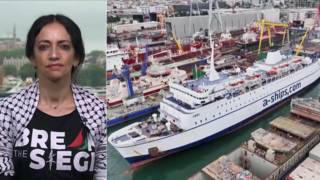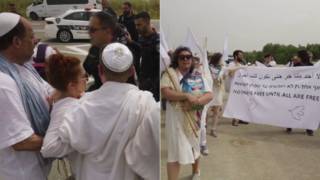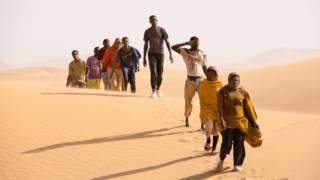
Related
Topics
Guests
- Laurence Bondardspokesperson and operations communications officer for SOS Méditerranée.
The number of refugees trying to reach European soil continues to grow due to worsening poverty, violence and the climate crisis, and over 1,100 refugees have perished crossing the Mediterranean so far this year, according to the United Nations. We speak with Laurence Bondard of SOS Méditerranée, a humanitarian group that rescues migrants at sea, who says there is a severe shortage of search-and-rescue resources in the area to address the crisis. “The people that are actually fleeing via the sea that are on tremendously unseaworthy dinghies — most of the time without life jackets, without enough food or water — are in extreme danger, and they cannot always be rescued,” Bondard says.
Transcript
NERMEEN SHAIKH: Over 700 refugees were rescued in the Mediterranean this weekend as they attempted to reach Europee. Most of the rescues occurred off the coast of Libya and Malta. Rescue ships are now looking for safe locations to disembark the asylum seekers, many of whom need urgent medical care. This is Anne Dekker speaking from the Sea-Watch 3 ship.
ANNE DEKKER: Many of them are, well, super exhausted, have fuel burns, are seasick, are dehydrated and have — quite a number of them has clinical diseases. We urgently need a port of safety. We have requested already several times a port of safety but so far have not received any reply. We’re in urgent need of getting a port of safety as soon as possible. We already have been doing a medevac of six critical patients. We need a port of safety as soon as possible.
NERMEEN SHAIKH: Another rescue group, SOS Méditerranée, has over 550 refugees on board its ship, after conducting six rescue operations this weekend. This comes as the number of refugees trying to reach European soil continues to grow due to worsening poverty, violence and the climate crisis. According to the United Nations, over 1,100 refugees have perished crossing the Mediterranean so far this year.
We’re joined now by Laurence Bondard, spokesperson and operations communications officer for SOS Méditerranée based in Paris, France. She’s been on four rescue missions in the Mediterranean, most recently March-April of this year.
Welcome to Democracy Now!, Laurence. If you could begin by talking about these rescue operations, what they entail, and why this particular crossing, Libya to Malta, or Libya to Italy, is as dangerous as it is?
LAURENCE BONDARD: Thank you very much for hosting me.
Yes, the Central Mediterranean is the migration — it’s the deadliest route in the world, and this is due to a terrible lack of search-and-rescue maritime assets in the area. There are very, very few search-and-rescue ships, mostly SAR NGO ships, and several of them are being hindered from operating. So, the people that are actually fleeing via the sea and that are on tremendously unseaworthy dinghies — most of the time without life jackets, without enough food or water — are in extreme danger, and they cannot always be rescued. Sometimes there are just no maritime assets in the area to rescue them. In addition to that, even when we are, for example, present — and we performed, as you were explaining, six rescues this weekend — we perform them without maritime coordination. And this means that despite the fact that we would ask for a maritime law, inform the rescue coordination centers at all steps of the rescues, we receive no coordination, no instructions, and we had to perform the rescues on our own.
JUAN GONZÁLEZ: And, Laurence, how have the European countries responded when your boats or other rescue boats attempt to dock in their countries? Are there any countries in particular that are more hostile than others?
LAURENCE BONDARD: First, this is not really the question. The question is — we did ask for places of safety. And a place of safety meets specific criterias. Place of safety is where basic needs are met for the people rescued at sea, meaning they can receive medical care, they will have food, water, and it’s also where their life is no longer threatened. For example, we would never disembark people rescued at sea off the coast of Libya in Libya, because it is not a place of safety. And this has been repeatedly said by U.N. and European institutions. So, we have now, indeed, requested several times for a place of safety to the competent maritime authorities and to the most able-to-assist maritime authorities. And this is — right now we are awaiting answers. We have not yet been given positive answers.
It is essential to understand that European solidarity here is crucial. Coastal states must be supported by European solidarity. And the number of people crossing is not that huge compared to the number of people living in Europe, the population in Europe. So it’s really just a question of political will.
JUAN GONZÁLEZ: And how has the COVID pandemic changed the rescue operations?
LAURENCE BONDARD: We have had to adapt. And since the outbreak of the pandemic, we’ve had implemented very strict COVID-19 protocols in order to guarantee the safety of our operations and the safety of the survivors on board and of our teams. So, for example, all of our teams are wearing specific protective — personal protective equipments. They do that in during rescues and on the deck of the ship. And when survivors arrive, they are explained the preventive measures to respect. They are given masks. There is a temperature check of all of them upon their arrival. And we’re asking them, for example, also to wash their hands as much as they can. Yeah, we are implementing very, very strict protocols on board.
NERMEEN SHAIKH: And, Laurence, could you explain? Even as the EU — various countries in the EU have been cracking down on voluntary rescue missions, such as the ones that your organization runs, they continue to support the Libyan Coast Guard in monitoring these crossings, these water crossings. Can you talk about the significance of that support, and what groups like yours are calling for? What are the conditions inside Libyan detention centers where the Libyan Coast Guard takes migrants?
LAURENCE BONDARD: Indeed, since 2018, Libya has been granted a search-and-rescue region, is responsible of search-and-rescue regions in international waters off their coast, which means that — and this is supported by the EU. They have been provided with patrol vessels and trainings and fundings for them to be able to intercept people trying to flee Libya via the sea. And these past years, but specifically even these past months, we’ve seen a huge increase in the number of interceptions at sea by Libyan Coast Guards. And these Libyan Coast Guards then return the survivors at sea to Libya. And this is absolutely illegal, and these are forcibly returns, as Libya, as I was explaining before, is not a place of safety, and maritime law is very clear: Rescue operations only end when survivors at sea are — people in distress at sea are disembarked in a place of safety.
And then, many, many reports do explain how people that have been intercepted on sea by Libyan Coast Guards and forcibly returned are returning to a cycle of violence, forcibly detained in detention centers. And we’ve heard, as well as we’ve read — we’ve also heard on board — testimonies of survivors who have attempted to cross the Mediterranean several times before we could rescue them. And they were explaining to us how they were beaten in detention centers, how they were — their family were called on the phone while they were beaten so that the family would send some money for them to be freed, how they would be risking their lives at all steps in the streets, because everyone apparently is armed in Libya, or many people are armed, and you can be killed just going out. Many women explained they just do not go out, as little as possible, only to go and get food and come back, because they’re really too afraid to be abducted or killed or to face sexual violence.
I’ve heard this harrowing story of this woman who was explaining that she was in a detention center with her small few-month-old baby, and some guards had dug a hole and put the baby in it, who was crying, and started to put sand over the baby in the hole. And the baby was crying. The mother was crying. Many women were around. And eventually they took back the baby and gave it back to the mother. This was more of a psychological threat.
But these kind of events and this kind of physical violence and psychological violence are daily reported to us by the survivors on board. One thing that most of the survivors say, if not all of them, is that Libya is hell on Earth and that they would rather die at sea than to die in Libya. For them, even if it’s taking tremendous risk to go at sea and to potentially die at sea, it’s still a hope to survive, whereas, for them, in Libya, they see no hope.
JUAN GONZÁLEZ: And, Laurence, I wanted to ask you — there have been over 1,100 refugees who have perished crossing through these dangerous sea routes just this year. Where are these refugees coming from? Are they largely from Libya or other North African countries? And why are they fleeing their homes?
LAURENCE BONDARD: So, the number you’re giving here is the number of people that are known to have died in the Mediterranean. Maybe there are more that, unfortunately, perished without any witness. And most of them died actually in the Central Mediterranean. Since the beginning of the year, 990 people died specifically in the Central Mediterranean.
Where they’re coming from, or where the people we rescue are coming from, some of them — a minority, but some of them — are fleeing from Libya directly, and most of them are indeed in a migration journey. Currently on board, we have a majority of Bangladeshi people and Malian and Egyptian one, but we have 22 nationalities on board coming from West Africa and sub-Saharan countries of Africa — Nigeria, Eritrea — many countries. We also have a few people currently on board that are coming from Yemen, from Syria.
And crises are many, plenty in the world, and people will try and flee. And then, when they are what they call trapped in Libya, which is not always their will, some of them tell us that they were not originally willing to come to Libya, but just on the way were, for example, trying to go to Algeria and were abducted in their way. The taxi driver would not drive them to Algeria, but to Libya, and they would realize they’re in Libya when they’re in it. And then they explain that they had no way out. That’s what I can say from what we see on board.
NERMEEN SHAIKH: Thank you so much, Laurence Bondard, spokesperson and —
LAURENCE BONDARD: Thank you.
NERMEEN SHAIKH: — operations communications officer for SOS Méditerranée, based in Paris, France. She’s been on four rescue missions in the Mediterranean, most recently March-April of this year.
Next, we’ll go to occupied East Jerusalem, where the Israeli Supreme Court has offered to allow Palestinian residents of Sheikh Jarrah to avoid being forcibly evicted from their homes, but only if they begin paying rent to a Jewish settlement organization. We’ll speak with one of the residents of Sheikh Jarrah who’s rejected the offer.













Media Options